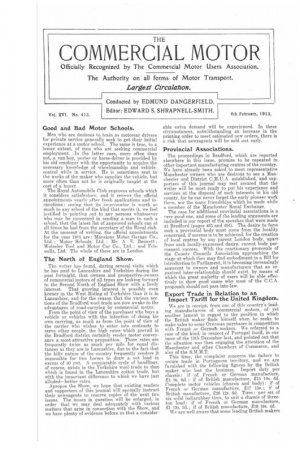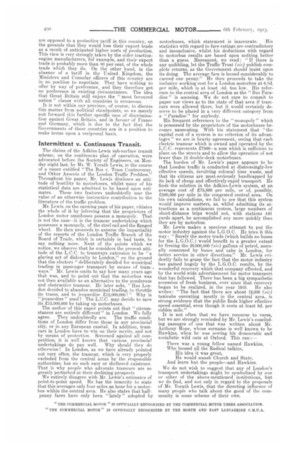Export Trade in Relation to an Import Tariff for the United Kingdom.
Page 1

Page 2

If you've noticed an error in this article please click here to report it so we can fix it.
We are in receipt, from one of this country's leading manufacturers of commercial motors, of yet another lament in regard to the position in which the British maker finds himself when he seeks to make sales to some Overseas purchaser in competition with French or Germali makers. We referred to a case of the kind, in respect of Portugal itself, in our issue of the 12th December last, and pointed out that the situation was then engaging the attention of the Manchester and other Chambers of Commerce, and also of the S.M.M.T.
This time, the complaint concerns the failure to secure trade in Portuguese territory, and we are furnished with the following figures by the British maker who lost the business. Import duty per chassis: if of French or German manufacture, £4 8s. 9d.; if of British manufacture, £15 10s. 6d. Complete motor vehicles (chassis and body): if of French or German manufacture, £17 158.; if of British manufacture, £26 12s. 6d. Tires: per set of six solid indiarubber tires, to suit a chassis of threeton load : if of French or German manufacture, 21 13s. 3d.; if of British manufacture, 219 19s. 4d. We are well aware that some leading British makers are opposed to a protective tariff in this country, on the grounds that they would lose their export trade as a result of anticipated higher costs of production. This view is very strongly taken by the older tractionengine manufacturers, for example, and their export trade is probably more than 80 per cent. of the whole trade which they do. On the other hand, in the absence of a tariff in the United Kingdom, the Ministers and Consular officers of this country are in no position to negotiate. They have nothing to offer by way of preference, and they therefore get no preference in existing circumstances. The idea that Great Britain still enjoys the " most favoured nation " clause with all countries is erroneous.
It is not within our province, of course, to discuss this matter from political standpoints, so we merely put forward this further specific Case of discrimination against Great Britain, and in favour of France and Germany, which is due to the fact that the Governments of those countries are in a position to make terms upon a reciprocal basis.






























